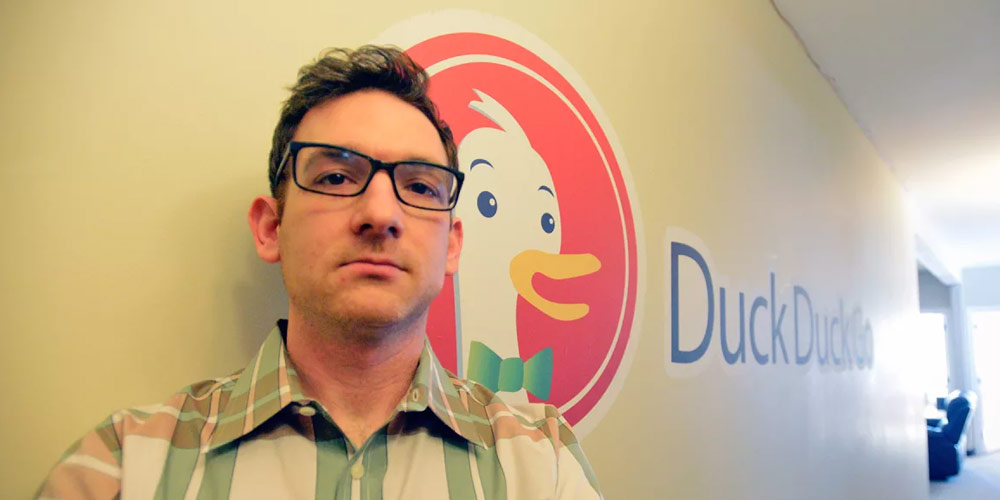
As an ambitious person, I am naturally attracted to hard problems.
- Gabriel Weinberg
Everything has to begin before it happens. Gabriel Weinberg was once a first-timer. And as a first-timer, he also tasted the bitterness of first-timer failure. But failing didn't stop him from becoming a successful entrepreneur in the industry he liked since he was a child. And he did it by doing something far from mainstream.
When Weinberg told his wife about his new business idea - establishing a search engine to compete with Google and Bing, for a brief moment she thought that he was out of his mind. But from his dedications, his savings and his will, Weinberg has proven to his wife, and to the world, that he might be crazy, but his idea does work.
Early Life
Gabriel Weinberg was born in 1979 in the District, and grew up in Atlanta, the capital of and the most populous city in the U.S. state of Georgia. His father is a physician and infectious-disease specialist, and his mother makes art and clothes. Weinberg was interested in computers and programming since he was young, and because of that, he taught himself to be a child hacker. His first job was building his mother a program to process orders on the internet.
In his middle and high school years, Weinberg excelled in science classes, especially Physics. Weinberg that played soccer and tennis as his favorite sports, spent a lot of time messing with his computers in his spare times. When he graduated high school, Weinberg took Physics at the Massachusetts Institute of Technology but didn't want to pursue it in graduate school. As one thing led to another, he eventually returned to his old hobby: programming.
Early Career
Gabriel Weinberg started his first company at MIT: a portal where teachers can put lesson plans online. At that time, he was naive and failed. His failure has taught him lessons to not fail when he started his next company while in Boston after graduating: The Names Database. It was a company that servers database to users where they could submit their email addresses and other people pay to get in touch with them. This time he succeeded.
The Names Database had 50,000 pay subscribers and was expected to generate less than a million dollars income in 2006. The company was acquired by United Online for approximately $10 million in cash in March that year. The acquisition has made the just-married Weinberg, a millionaire in his 20s.
Weinberg took his time off work and tried exploring several new ideas. Across multiple projects, he focused on structured data, Quora-style Q&A, and programmatically combating spam.
"I started all of these projects independently and none of them really took off," said Weinberg.
DuckDuckGo

With the money he has saved, Gabriel Weinberg started thinking about founding another company while his wife worked and he captained the house. The idea was to create a search engine that may pit against the more mature, bigger, more powerful, more sophisticated and more advanced search engines like Google and Bing. When he asked his wife for her opinion, she thought that he was nuts. "She was like, 'What are you doing?’'" Weinberg said. "She thought the idea was crazy."
His wife's theory was hard to deny. Thinking of a startup that is willing to grow by taking on the 'big boys' like Google in the search industry, is like a raft taking on a cruise ship as an option for vacation. But Weinberg's mind was fixed. Despite his wife's impression that was not at all supportive, Weinberg continued developing his idea.
Google's way of making money; its place where products are mostly capitalized by games created by marketers; its pages that are cluttered with ads; search queries that are tracked, logged and personalized, occupied his mind. And for that, he wanted to create an 'alternative'.
"My thesis for the company was, what can we do that other search engines, because they're big, can't do easily?" said Weinberg. "Because what's good for Google business is bad for Google users."
The company was based at his home until 2011 when he raised $3 million investment from Union Square Ventures. With the money on his hands, Weinberg opened his new five-room, home-styled office in the suburban of Paoli, Philadelphia; not far from Valley Forge and Bravo Pizza. The building is looking more 'odd' that it is an office with the looks of a stone castle. Weinberg and his programmers occupy the second floor while an eye doctor occupies the first floor.
The startup office is not at all flashy. The working place is kept practical with no stuffs that most startups have. "I've always been pretty cheap," he said. "We're pretty practical around here." Being practical doesn't mean there is no rule. But it allows one of the programmers to occasionally bring his dog, Hex.
Weinberg's idea for a search engine project is called DuckDuckGo, after the children’s game Duck, Duck, Goose. The website was first launched on September 25th, 2008.
Weinberg has more than seven full-timers when he started, four of whom work from Chester County, in addition to more than 20 freelancers, most of whom work virtually from around the world. (Most of his employees were working in the company's open source community).
DuckDuckGo is meant to be a search engine that Google couldn't be: a search engine that does not track users, generating search results without having to know the user's interests, doesn't filter out relevant information and isn't cluttered with ads. DuckDuckGo is built similar to the original Google - a simple and pure search engine.
Rising and Competing
The first thing that came to Weinberg's mind after he founded DuckDuckGo is: practicality. He wanted to build a search engine that people could use quickly without any compromises, but he didn't have the human resource to build the search engine from scratch. Weinberg decided to get search results from Yahoo! (now powered by Bing) and others for most of his search results, and use his programming skills to curate the top few links.
"If you can control the top three links, you're actually controlling 80 to 90 percent of searches," said Weinberg.
The search engine is written in Perl and runs on nginx, FreeBSD and Linux. Because it uses search APIs from various vendors, it's also known to be a "hybrid" search engine. And with DuckDuckGo linked to Wolfram Alpha, Wikipedia and Yelp, it's also able to give definitive answers to factual queries.
"When you do a search, you generally want an answer. You don't necessarily want to click around links," said Weinberg. "It's our job to try to get an answer. Our grand vision is that that happens for 80 percent of queries, even for very niche things."
Although this was Weinberg's focus, tracking users is never on his list of things to do. Weinberg's business model is to serve one or two easy-to-miss ads based on the user's search query.
Weinberg's initial target for DuckDuckGo was to own 1 percent of the search market. "It's never been my interest to maximize revenue," he said.
As years passed, DuckDuckGo eventually reached its milestone. And after privacy has became one the major issue to be online with 73 percent of internet users thought that tracking is an invasion of privacy, DuckDuckGo's traffic increased and owned 5 percent of the search market.
Weinberg quickly incorporated his 'relatively unknown' website under the name DuckDuckGo, Inc., and paid $7,000 to put up his company's first ever advertisement on a billboard in San Francisco. The billboard featured his company's logo and "Google tracks you. We don't." motto. On that time, when people click on the "about" link on the website, they will land on a page that said: "We don't track you," and that brings them to another page that featured pictures from Google searches and a self-promoting speech:
"When you search Google, and click on a link, your search term is usually sent to that site, along with your browser & computer info, which can often uniquely identify you. That's creepy, but who cares about some random site? Those sites usually have third-party ads, and those third-parties build profiles about you, and that's why those ads follow you everywhere. That's creepy too, but who cares about some herpes ads? Your profile can also be sold, and potentially show up in unwanted places, like higher prices and getting insurance."
And when users scroll further, there was more "creepiness" they can see before getting into another line that said:
"That's why we don't send your searches to other sites. Or store any personal information at all. That's our privacy policy in a nutshell."
Becoming an Odd Competitor
DuckDuckGo's odd-looking office might be one thing. But Weinberg's non-ambitious goals with DuckDuckGo to not track users - the opposite of what others are doing, has made him a particularly dangerous competitor. DuckDuckGo's potential to do almost anything other search engines can and can't, could be a serious long-term threat, especially to Google. And if one day users see that DuckDuckGo is better than other search engines, DuckDuckGo could cause further damage to their business model without even trying.
Google is the number one search engine in the modern internet. Despite serving various and multiple services across many platforms, Google still holds the top position in the search engine industry by owning most of the search engine market. Debates about DuckDuckGo as a competitor was heard when the little company entered the market with pride. Some said that evolution has made Google vulnerable and opened an opportunity for startups like DuckDuckGo to compete in the search engine market. But some denied this by saying: even if DuckDuckGo eventually be able to become big, Google's market share will not take a dent. And if DuckDuckGo become too successful, the data sources Weinberg is using could see DuckDuckGo as a threat and close their service to it. Not to mention any innovations DuckDuckGo can come up with or acquire, could easily be copied by Google.
The attention to DuckDuckGo comes as U.S. and European Union officials are stepping up scrutiny into Google's search practices, which have been criticized for unfairly elbowing out competitors' content and results in favor of its own. Earlier in 2012, in a response to criticism that it was acting monopolistic, Google publicly identified DuckDuckGo as a competitor. Not because they both move in the same industry, but because they are different.
Google and DuckDuck as competitors is more hyperbolic that it is in reality. Google processes billions of searches a day while DuckDuckGo only processes millions. And if the little search engine wants to get more share from the 'big boys', it has to do much better than that. With Google already seeing Weinberg's company as a small relentless competitor, the search giant copied DuckDuckGo's answer system by putting a box with answers from its Knowledge Graph.
Despite the pressure DuckDuck go is having, Weinberg says he isn't too worried. As search engines turn more toward answers, he thinks outside data providers will see him as less of a threat than Google. And being a lot smaller than Google, DuckDuckGo can adapt to market changes more quickly.
And post-NSA leaks, more people are concerned about their well-being on the internet. With Google becoming one of the tech companies that the governments are aiming, DuckDuckGo's user base is growing a lot faster, increasing at an exponential rate.
The sudden success caused by the increase in traffic and search queries didn't send the site to crash. Nor did it change the company's focus. Although DuckDuckGo started its life as an idea that was seen to be impossible, it has finally become Google's competitor, a threat because it approaches the first thing Google can't ever provide: privacy.
As the smallest competitor for the search giant, DuckDuckGo has a lot of work to do. On May 2014, DuckDuckGo revamps its website and released new features such as a new beta interface focusing on smarter answers, easier access to image, local places, video search, auto-suggest, and more. This new design has given the little search engine a better look, maturing itself to be similar to Google and other modern search engines.

Other Works
Beside being CEO of DuckDuckGo, Gabriel Weinberg serves as an Advisor of Cadio, Inc.. He is also a Vice President of Product Development at LexisNexis, a Member of Business Development Advisory Board at Notehall, Inc. and a Director at WizeHive, Inc..
Weinberg is an active angel investor. Before doing any investments, Weinberg first tell his wife, giving her his version of their speech.
Personal Life
Gabriel Weinberg and his wife have three children. The family settled near Paoli, Philadelphia, not far from DuckDuckGo's office and within walking distance of Valley Forge National Park.
As an ambitious person, he likes solving difficult problems and challenges. Weinberg that still continued his computer hobby during his spare time at home also became a blogger where he often share his thoughts, opinions and tips. He often takes his work back to his house, where next to his desk beside the monitors, there is an area with toys where his children can play while he codes.
Despite Silicon Valley being the most famous place for tech startups and IT entrepreneurs, Weinberg has been there just one day in the past decade. He also never appears at big tech conferences.
"The problem I have with that kind of lifestyle is that it's not very family-oriented," said Weinberg. "It's never been my goal to be Mark Zuckerberg. My goal has always been to do something interesting and unique."
